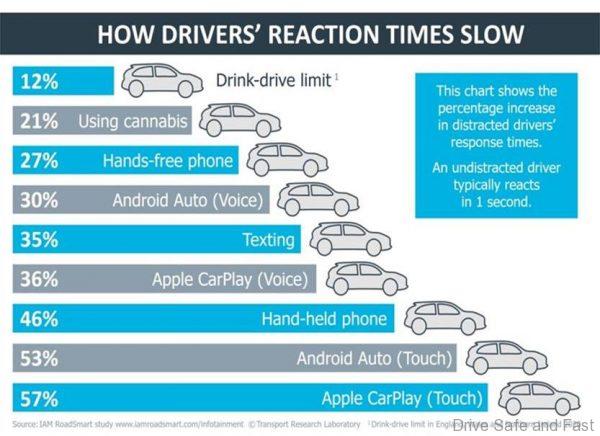Nowadays, car manufacturers are laughed out of the room for not including Android Auto and/or Apple Carplay as part of their infotainment suites. But a new study by the 60 year old road safety research organisation, IAM Roadsmart, indicates that these infotainment systems are EXTREMELY dangerous. More dangerous than texting or driving drunk too!

Data collected by IAM Roadsmart showed that Apple Carplay and Android Auto slowed driver reaction times by more than 50%. Metrics that were measured include stopping distance, lane control and response to external stimuli. It was in fact, worse than using a phone, texting or even drink-driving. No other research institutes have come forward to back up these claims as far as I can tell.

Personally, I am on the side of this study. To me, there are 3 main problems with a touchscreen.
- The user interfaced is usually very cluttered with air cond controls, bluetooth, Navigation and options all appearing on one screen, sometimes at one go
- Buttons are placed contextually. This means from menu to menu, users may have to look at what’s being displayed, process which function they require and then hunt for the part of the screen with the button.
- Touchscreens provide no tactile feedback. With physical buttons, you can ‘feel’ your way. Once familiar with a headunit, you’ll know instinctively which buttons do what just by feeling where they are. On a touchscreen, it’s a lot tougher, as buttons all appear on that flat and wide plastic screen. Some infotainment units don’t even give you haptic or audio feedback for when a button is clicked.
Here’s the press release from the researchers:
PRESS RELEASE
Worrying results from a new study released today show that the latest in-vehicle infotainment systems, designed to improve road safety, are failing and impair reactions times behind the wheel more than alcohol and cannabis use.
Among the shocking results, the study – commissioned by the UK’s largest independent road-safety charity, IAM RoadSmart, found that reaction times at motorway speeds increased average stopping distances to between four and five car lengths. The study also found that drivers took their eyes off the road for as long as 16 seconds while driving (equivalent to a distance of more than 500 metres at 70 mph), and using touch control resulted in reaction times that were even worse than texting while driving.
Commenting on the alarming findings, Neil Greig, policy and research director, IAM RoadSmart, said: “Driver distraction is estimated to be a factor in around a third of all road collisions in Europe each year.
“While previous research indicates that Apple CarPlay and Android Auto perform better than more traditional buttons and controls, the results from this latest study raise some serious concerns about the development and use of the latest in-vehicle infotainment systems. Anything that distracts a driver’s eyes or mind from the road is bad news for road safety.
“We’re now calling on industry and government to openly test and approve such systems and develop consistent standards that genuinely help minimise driver distraction.”
During the study, which was undertaken by TRL on behalf of IAM RoadSmart, the FIA and the Rees Jeffreys Road Fund, drivers completed a series of three drives on the same simulated test route to assess the level of impact of Android Auto and Apple CarPlay. On the first run, drivers did not interact with the system. On subsequent runs, drivers interacted with the system using voice control only and then using touch control only.
Both methods of control were found to significantly distract drivers, however touchscreen control proved the more distracting of the two. While many drivers realised the system was causing a distraction and modified their behaviour by, for example, slowing down, performance was still adversely affected with drivers unable to maintain a constant distance to the vehicle in front, reacting more slowly to sudden occurrences and deviating outside of their lane.
Neil added: “While we would like to see a review of these systems in the future, we’d encourage owners of vehicles fitted with these systems to use them in the safest possible way, including setting everything up before starting a journey.
“Most participants in the study report they use touch rather than voice control in real world driving. As the results clearly show, this is the most distracting, so if there is a need to use the systems while on the go, voice control is a far safer method.
“Individuals driving for work are just as at risk as the general public, so we would also encourage employers to review their advice and policies in light of this research.”
The key findings from the report are:
– Controlling the vehicle’s position in the lane and keeping a consistent speed and headway to the vehicle in front suffered significantly when interacting with either Android Auto or Apple CarPlay, particularly when using touch control
– Participants failed to react as often to a stimulus on the road ahead when engaging with either Android Auto or Apple CarPlay – with reaction times being more than 50 per cent slower
– Reaction time to a stimulus on the road ahead was slower when selecting music through Spotify while using Android Auto and Apple CarPlay (via touch control rather than voice control), compared to texting while driving (based on previous studies)
– Use of either system via touch control caused drivers to take their eyes off the road for longer than 12 seconds. This does not meet the guidelines set out by NHTSA (National Highway Traffic Safety Administration). When using voice control all measures were within NHTSA guidelines
– Participants underestimated the time they thought they spent looking away from the road, by as much as five seconds, when engaging with Android Auto and Apple CarPlay via touch control